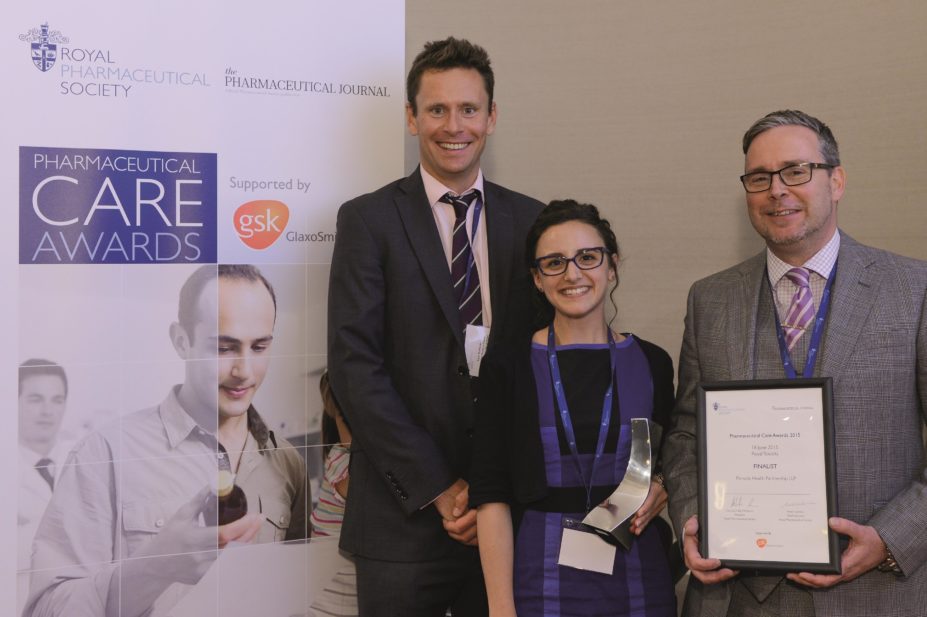
Simon Wright / The Pharmaceutical Journal
A community pharmacy project that identified people with blood borne viruses and provided patients with on-site access to a hepatologist won the audience choice award for the most reproducible project at the Pharmaceutical Care Awards 2015 in London on 18 June 2015.
The awards are organised by the Royal Pharmaceutical Society and The Pharmaceutical Journal and supported by GlaxoSmithKline.
People living on the Isle of Wight who were at risk of infection with hepatitis B, hepatitis C or HIV were the prime targets of the project, called ‘Blood borne virus testing in community pharmacies: an innovative integrative care model’.
“So far, 88 people have been tested and seven have been diagnosed with hepatitis C and one with hepatitis B, that’s a 10% positive test rate,” proj
ect-lead Kevin Noble, pharmacist at Pinnacle Health Partnership on the Isle of Wight told
The Pharmaceutical Journal after winning the award. In the UK, the overall incidence of hepatitis C is estimated to be 0.5%. “Community pharmacy has access to people at risk of infection and so it is a good site for testing,” he says.
Undiagnosed cases of hepatitis C are a major barrier to effective management of the disease. But even after diagnosis, only one third of patients actually go on to receive care from a specialist, according to previous research by the same community pharmacy team. This project aimed to close the gap between diagnosis and treatment. Noble partnered with Ryan Buchanan, a registrar specialising in liver disease at Southampton University hospital, who consulted with the hepatitis C or hepatitis B positive patients on-site at the community pharmacy. He is completing a PhD with a focus on hepatitis C on the Isle of Wight. “By going out into the community this skipped a step in the usual care pathway and I got to see 100% of patients straight away, rather than waiting the four months it usually takes for them to be seen by a specialist,” he says. This enabled Buchanan to order more tests and “find out how sick they are”.
Before this project was implemented, Noble and team were already offering hepatitis B vaccination and a virus testing service to various groups at risk of infection. The current project started after Noble was “chatting” with Buchanan and told him that community pharmacy now had the technology to feed referrals to hepatologists. Buchanan calculated that there were around 200 people on the Isle of Wight who do not know that they have hepatitis C. And so the two teamed up in an effort to identify these cases.
Access to the testing service was expanded across the island, with 18 community pharmacies taking part. In addition, an island-wide media campaign sought to encourage at-risk members of the public to be tested. Dried blood spot testing was performed, which involves the patient pricking their finger and dabbing a few spots of blood on a sterile card. This is sent to a laboratory in Manchester for testing, with the results usually taking one to two weeks to come back. If patients had a positive result they were called back to the pharmacy where they could be counselled by the pharmacist and liver specialist Buchanan.
However, even after diagnosis, patients on the Isle of Wight must travel to the mainland to be given treatment. This can present problems. “Injecting drug users are at particular risk of hepatitis C and their lives are often chaotic and they have no symptoms, so there is little incentive for them to take the ferry to access services in Southampton,” says Noble.
The next phase of the project aims to address this problem in particular. “We want to develop a treatment system on the Isle of Wight,” says Buchanan. Hepatitis C treatment is changing dramatically and it means it is now possible to manage patients in the community pharmacy setting, he explains. “We are planning on implementing this in the next six months,” he says.
In the past year, a slew of new medicines with cure rates up to 90% have been launched for hepatitis C. Compared with previous treatments such as peginterferon, these drugs have less severe side-effects and are taken orally.
Noble says there will be pharmacy-based treatment centres in each area of the Isle of Wight. Patients like it when care is brought to the community setting, Buchanan adds. “Community pharmacies are close to patients and there is often an empty consultation room. I don’t see why you couldn’t have cardiologists, for example, using them too. The scope for this is massive.”
Buchanan told the audience during the event Q&A session that “the days of ivory tower hospitals are over”.
Five other pharmacy projects were presented at the Pharmaceutical Care Awards, which took place at the Royal Society in London. The audience voted the blood borne virus project the “most reproducible”. Noble says that he would encourage other pharmacists to play to their strengths and be proactive when setting up projects. “It can be as simple as having a discussion with your colleague,” he says.
You may also be interested in
Long service of members

Membership fees 2022
